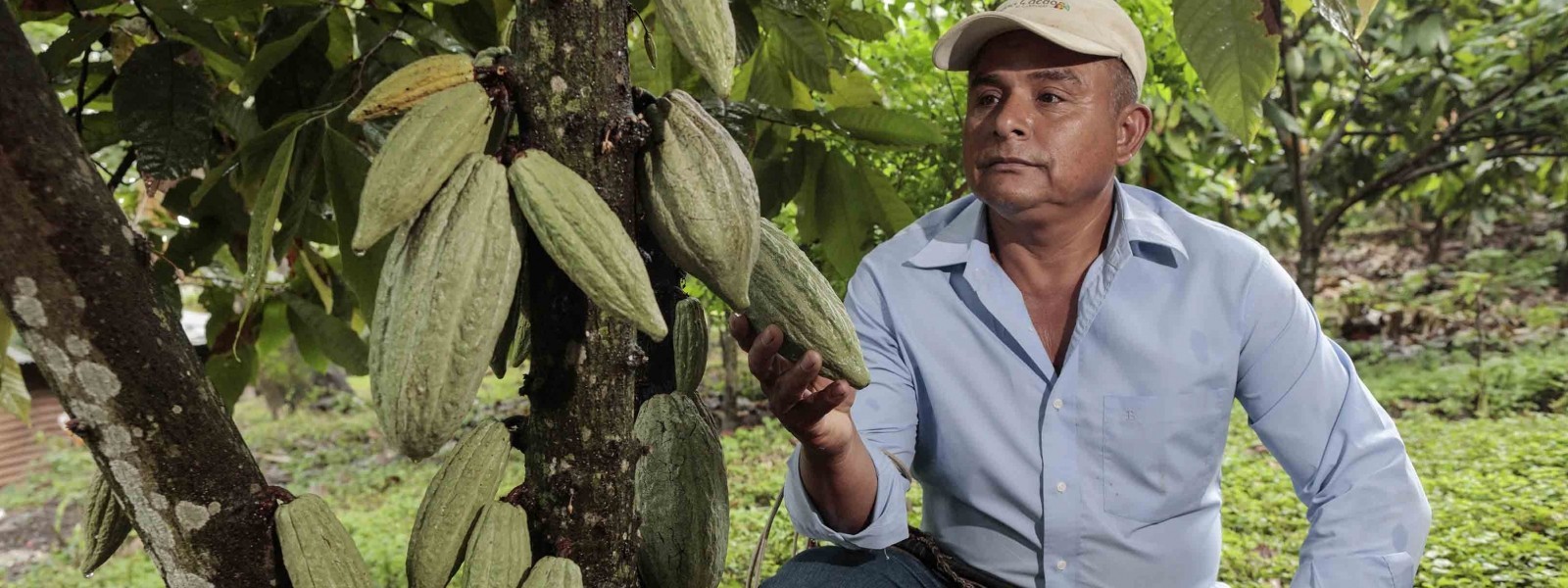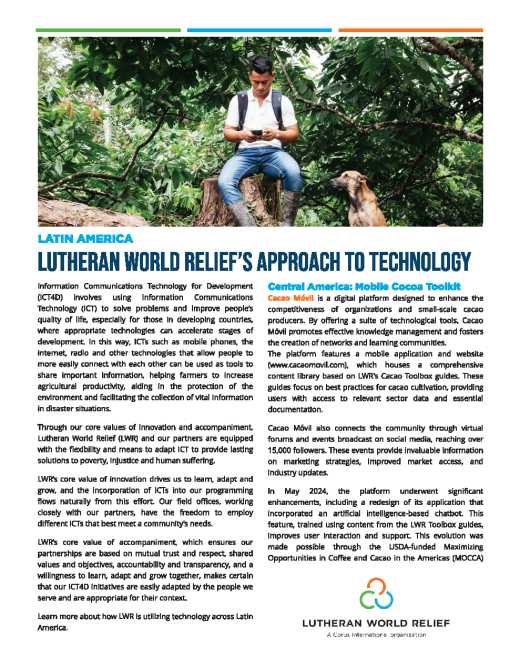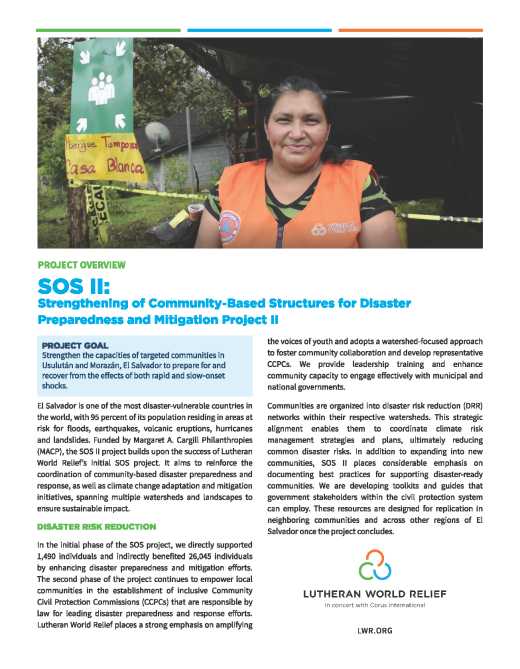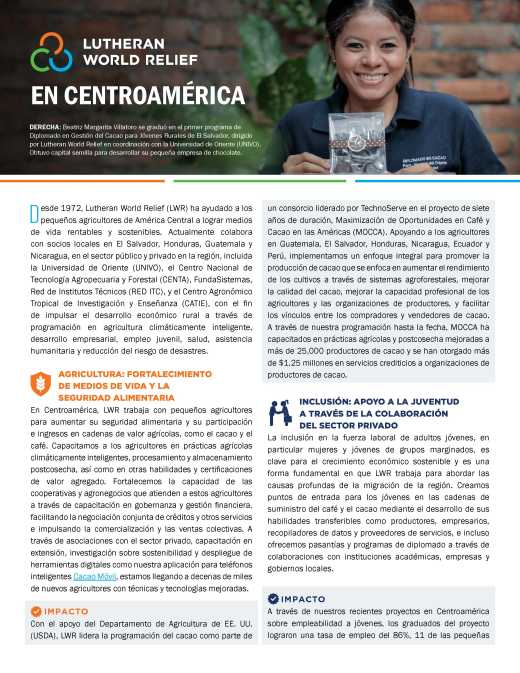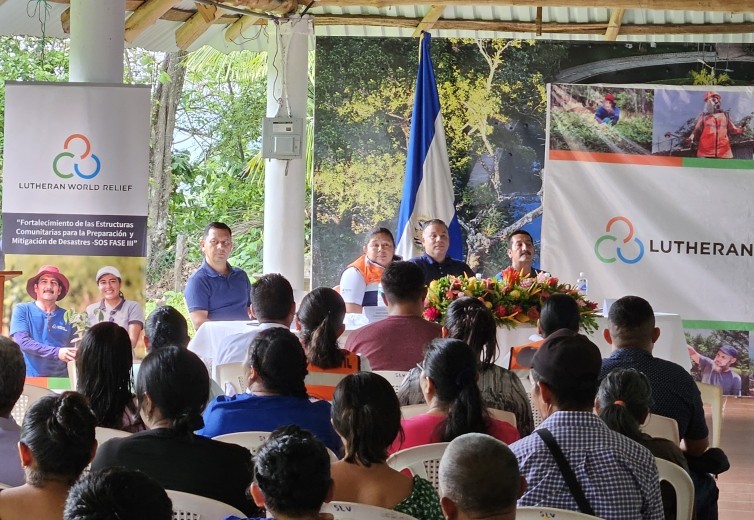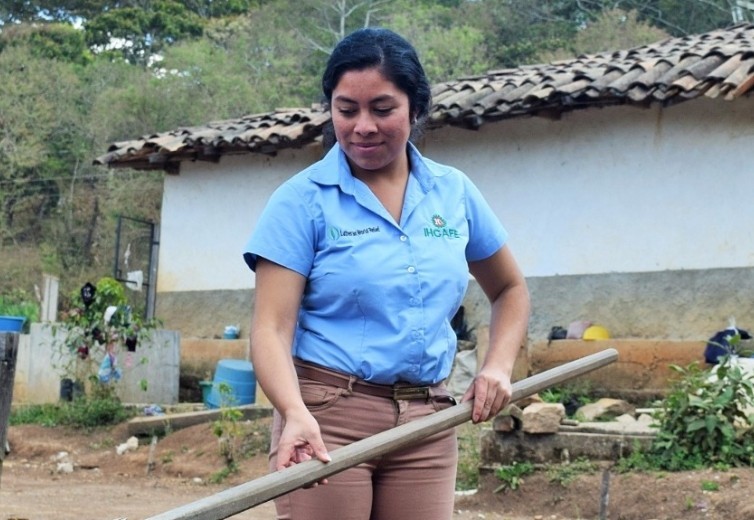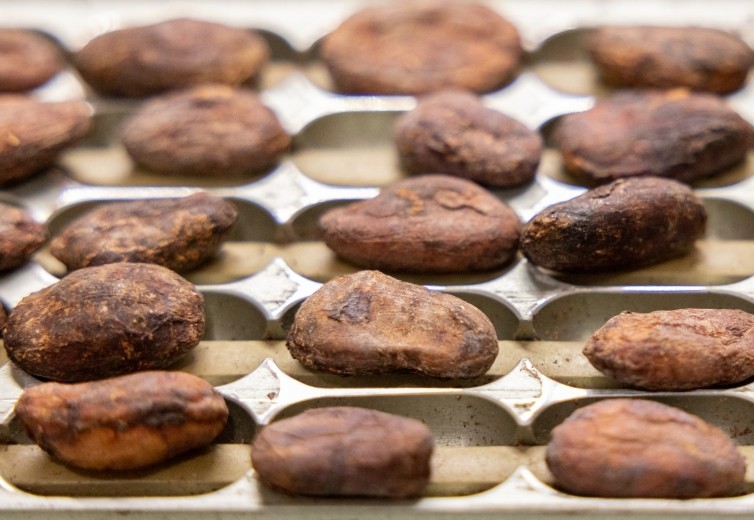El Salvador is one of the most disaster-vulnerable countries in the world, with 95 percent of its population residing in areas at risk for flood, earthquakes, volcanic eruption, hurricanes and landslides. As the 14th most exposed country to climate change worldwide, El Salvador is experiencing increasingly unpredictable and severe weather patterns, including drought every year since 2011. There is significant need for improved disaster preparedness and risk reduction to enable rapid recovery of rural livelihoods and make disasters less costly. The country’s diminishing annual water supply per capita is leaving thousands without access to drinking water, and many more with limited or intermittent access. Climate change is exacerbating poverty and worsening food security and viability for rural livelihoods, especially among youth and women. The lack of economic opportunities combined with heightened levels of violence in El Salvador are fueling migration.
Lutheran World Relief has worked in Central America since 1972 to promote sustainable livelihoods for rural farmers. We support El Salvador in climate-smart agriculture efforts to strengthen cocoa production, promoting private and public sector investment in the value chain and improving food security.
In El Salvador, Lutheran World Relief works with local nongovernmental organizations (NGOs), farming cooperatives, international agencies, and foundations to strengthen local capacity for the advancement of rural economies and disaster risk reduction.
Project Highlights
Utilizing USAID's Positive Youth Development framework, Lutheran World Relief supports youth between the ages of 18 and 30 in the eastern region of El Salvador to improve their income as entrepreneurs. Partnering with the Universidad de Oriente (UNIVO), Lutheran World Relief creates an enabling and inclusive environment for youth entrepreneurs by ensuring access to seed capital and fostering market linkages. With training, technical assistance and financial and material resources (e.g., laptops), youth leaders are developing soft skills, elaborating sustainable business models and acting as agents of change in their communities.
The SOS project is a 3-year, $2.5 million project funded by the Margaret A. Cargill Foundation that works to strengthen the capacity of vulnerable rural communities across 10 municipalities in the departments of Usulután and Morazán to prepare for and recover from natural disasters. The project helps local communities elect inclusive and representative Community Civil Protection Commissions that by law are the principal local bodies responsible for preparing for and responding to disasters. Lutheran World Relief supports these local commissions by delivering leadership training and strengthening the capacities of communities to interact with municipal and national governments. Through community-based disaster preparedness and response structures, municipal government employees, women, youth volunteers, and other community leaders and members are better equipped to save lives and livelihoods, ensuring community resilience by allowing future disaster recovery to be faster, less expensive and more sustainable.
Under the SOS project framework, and with emergency response funding from Margaret A. Cargill Philanthropies, Lutheran World Relief supported communities in the department of Usulután gain access to potable water. With technical assistance, training and material resource provision, communities established reservoirs for water storage and families acquired the infrastructure necessary for rainwater collection as part of a drought mitigation plan. Lutheran World Relief also strengthened the capacity of community water harvesting coalitions to monitor water access, maintain infrastructure and train families on water management techniques and family garden plots.
Under the SOS Project framework, and with emergency response funding from Margaret A. Cargill Philanthropies, Lutheran World Relief provided emergency food relief, personal protective equipment and hygiene kits to meet household needs during stay-at-home orders that resulted in the reduction or loss of family income. The COVID-19 response was implemented with the support of 50 community civil protection commissions and a network of 70 youth volunteers.
Lutheran World Relief worked with vulnerable populations in the rural municipalities of Suchitoto, El Paisnal, La Nueva Concepción, Guazapa and Tonacatepeque in the San Salvador department to increase food production and household income with an emphasis on expanding organic production, improving quality of food storage, improving seed access, and strengthening entrepreneurial opportunities. By working with local partners that included the Agriculture and Livestock Ministry of El Salvador and the National Center for Agricultural and Forestry Technology (CENTA), Lutheran World Relief advanced livelihoods for smallholder women farmers and supported toolkits for at-risk youth to avoid gangs and prevent migration.
Lutheran World Relief, in partnership with a consortium led by Catholic Relief Services, worked to address critical economic and environmental challenges in El Salvador by establishing cacao agroforestry systems that restore and conserve biodiversity for sustainable rural development to increase income and employment opportunities for smallholder farmers and cooperatives. With funding from the U.S. Agency for International Development (USAID) and the Howard G. Buffett Foundation, the project strengthened the organizational capacity of cacao cooperatives, funded innovative small business initiatives of youth and women, improved producers’ access to financial services and trained 2,000 producers on sustainable farming. Lutheran World Relief also partnered with the Universidad de Oriente (UNIVO) to offer a training program for at-risk youth to become community-based extension workers in the cacao value chain, providing hope and opportunity for young men and women within El Salvador’s borders.
MOCCA is a multi-country initiative led by Technoserve and funded by the U.S. Department of Agriculture that helps Latin American farmers overcome the barriers to effectively rehabilitate and renovate their coffee and cocoa plants – increasing their productivity while improving their marketing capacity, incomes and livelihoods. El Salvador is one of six countries that is part of the 5-year, $10.5 million project. Lutheran World Relief leads MOCCA’s cacao programming, helping farmers sell more at better prices, improving farmer productivity and enhancing sector coordination to drive competitiveness and growth.
The Corus Effect
Lutheran World Relief is part of Corus International, an ensemble of global leaders in international development and humanitarian assistance. In addition to Lutheran World Relief, the Corus family of organizations includes global public health agency IMA World Health, U.K.-based technology for development company CGA Technologies, impact investing group Ground Up Investing, and direct trade company Farmers Market Brands.
We operate as permanent partners, integrating expertise, disciplines, approaches and resources to overcome global health challenges, develop productive and stable economies, improve resilience in the face of climate change, and respond to natural disasters and humanitarian crises.
With the support of our family’s diverse set of partners and funding – from multi- and bilateral institutions and foundations to the private sector and individuals – we invest in solutions that are innovative, scalable, holistic and move the needle towards transformational change.


